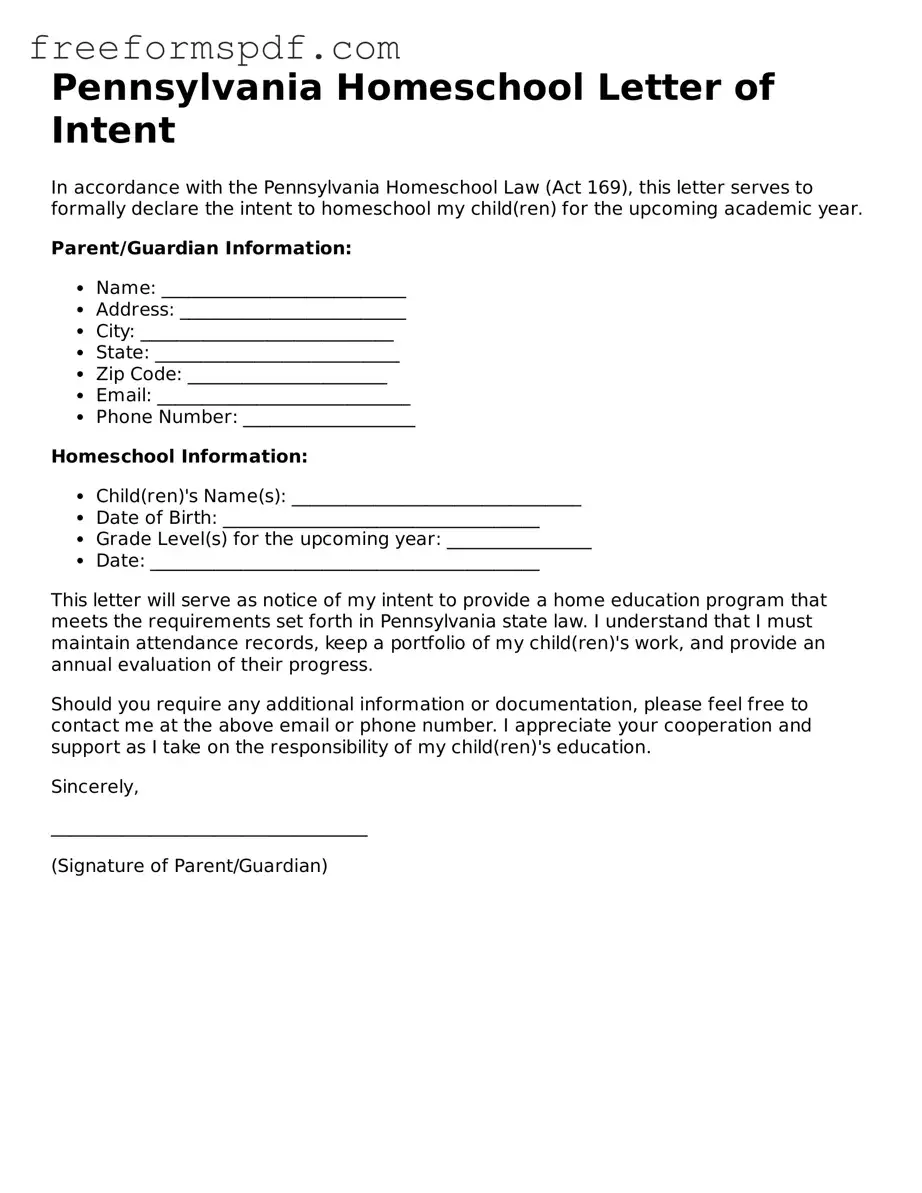Attorney-Verified Homeschool Letter of Intent Document for Pennsylvania State
Common mistakes
-
Incomplete Information: Failing to provide all required personal details, such as the names and ages of the children, can lead to delays in processing.
-
Incorrect Dates: Entering the wrong start date for the homeschooling year can result in confusion regarding compliance with state regulations.
-
Missing Signatures: Not signing the form can render it invalid. Ensure that all required signatures are included before submission.
-
Omitting Educational Plans: Failing to outline the educational plan for the year can raise questions about the intent to provide a proper education.
-
Incorrect Format: Submitting the form in an unapproved format or without necessary attachments can lead to rejection.
-
Neglecting to Update Information: If there are changes in the homeschooling situation, such as a new address or a change in curriculum, these must be communicated promptly.
-
Ignoring Submission Deadlines: Missing the deadline for submitting the Letter of Intent can lead to penalties or the inability to homeschool for that year.
Learn More on This Form
-
What is the Pennsylvania Homeschool Letter of Intent form?
The Pennsylvania Homeschool Letter of Intent form is a document that parents or guardians must submit to officially notify their local school district of their decision to homeschool their child. This form is a crucial first step in the homeschooling process in Pennsylvania.
-
Who needs to submit this form?
Any parent or guardian who wishes to homeschool their child in Pennsylvania must submit this form. It applies to children of compulsory school age, typically between the ages of 6 and 18.
-
When should I submit the Letter of Intent?
The Letter of Intent should be submitted at the beginning of the school year or when you decide to start homeschooling. It’s best to submit it at least one week before you begin your homeschooling program to ensure compliance with state regulations.
-
What information do I need to include in the form?
The form requires basic information such as the child's name, age, and address. Additionally, you should include the educational goals and objectives for your homeschooling program. This helps the school district understand your educational plan.
-
Do I need to provide any additional documents with the form?
No additional documents are required when submitting the Letter of Intent. However, it’s wise to keep a copy of the form for your records. You may also want to prepare any future documentation related to your homeschooling curriculum.
-
What happens after I submit the Letter of Intent?
Once you submit the Letter of Intent, the school district will acknowledge receipt of your form. They may contact you for any further information or clarification, but generally, you can begin homeschooling your child without any further steps.
-
Can I change my mind after submitting the Letter of Intent?
Yes, you can change your mind. If you decide to stop homeschooling, you should inform the school district. It’s important to communicate any changes in your educational plans to ensure compliance with state laws.
-
Are there any penalties for not submitting the Letter of Intent?
Failing to submit the Letter of Intent may result in legal consequences, including potential truancy charges. It’s essential to follow the proper procedures to avoid complications and ensure your child’s education is recognized by the state.
Misconceptions
Many people have misunderstandings about the Pennsylvania Homeschool Letter of Intent form. Here are seven common misconceptions, along with clarifications to help clear up any confusion.
-
Homeschooling in Pennsylvania is unregulated.
This is not true. Pennsylvania has specific laws governing homeschooling. Parents must submit a Letter of Intent and adhere to educational guidelines.
-
Only parents can submit the Letter of Intent.
While parents typically submit the form, guardians or other authorized individuals can also file it on behalf of the child.
-
The Letter of Intent is a permanent document.
In reality, the Letter of Intent must be submitted annually. Each year, families need to renew their intent to homeschool.
-
Submitting the Letter of Intent guarantees approval.
Submitting the form does not guarantee approval. It merely notifies the school district of your intent to homeschool.
-
There is a specific format for the Letter of Intent.
The law does not require a specific format. However, it must include essential information like the child's name and age.
-
You cannot change your mind after submitting the Letter of Intent.
Families can change their minds. If you decide to enroll your child in a traditional school after submitting the form, you can do so without penalty.
-
Homeschooling parents do not need to keep records.
This is a misconception. Parents are required to maintain educational records and provide assessments to ensure compliance with state regulations.
Some Other Homeschool Letter of Intent State Templates
How to Become Homeschooled - A professional communication to affirm your decision to homeschool.
Understanding the purpose of a Hold Harmless Agreement for event coordination is crucial for those involved in organizing activities where liability might be a concern. This document facilitates a mutual understanding and secures protections among parties, clarifying responsibilities and minimizing potential disputes.
What Do You Need to Home School Your Child - This letter showcases your dedication to personalized learning.
